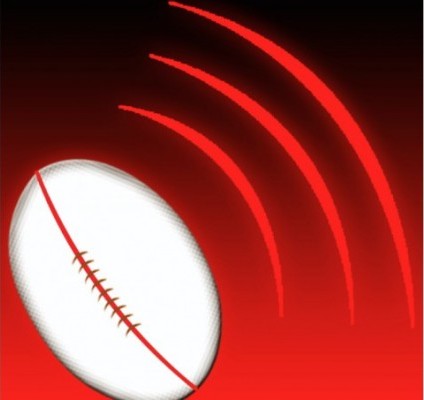The Maturation of Frieda Fetu'u
The Maturation of Frieda Fetu'u
We're in an age where more “pathway products,” players nurtured in the national age-grade system, are graduating to the senior national team. With the build-out of the Girls High School All American (GHSAA) program, those athletes are entering the system at younger ages. It affords the public years to watch those determined players mature from GHSAA to senior Eagle, and the process is a truly enjoyable one.
When Frieda Fetu’u first worked into the U20s (now Women’s Junior All American [WJAA]) player pool, she had just finished her junior year of high school. The California native ran track-and-field and had some middle school football in her background, but rugby was in her family (Sacramento Amazons coach Sefesi Green is Fetu’u’s uncle). With her dad’s encouragement, she joined Lowland (now Vipers) when she moved to Utah. In summer 2012, Fetu’u featured at an all-star event in Boise, Idaho, where the hard-running flanker was discovered.
“You must be writing the wrong person,” Fetu’u responded to then-WJAA coach Danielle Miller, who had invited Fetu’u to a 10-day U20 camp in Lake Placid, N.Y., that summer. “I just started playing!”
Scouts saw raw talent, but Fetu’u wasn’t heading to New York with this well laid plan that built toward the senior national team. In fact, she was shocked when her assumptions about girls’ rugby in the U.S. contrasted with the reality that unfolded in Lake Placid.
“I was so unprepared,” Fetu’u remembered her first camp. “Honestly, I didn’t think it would too hard. But those girls have passion, and they will take you down. It was eye-opening, and helped me realize what areas of my game needed improvement.”
But performance is only half of the equation at these assemblies. Fetu’u, who is now one of the more vocal, vibrant personalities in the U20 ranks, was meek and mild at the outset.
“I had my relative, Joanne Fa’avesi, out there, and she helped me out a lot,” Fetu’u spoke to comfortability. “And Meya Bizer. I was the quiet one, not really talking to anyone. Meya came over and talked to me personally, made me understand that I had to get to know these people, so we could develop a chemistry when we played together.”
Fetu’u was hooked, but something kept her from buying in fully. She tried out for the 2013 U20 Nations Cup but didn’t make the squad.
“I was still fresh to this whole USA All American thing and wasn’t really serious about it,” Fetu’u confessed. “I didn’t try as hard as I could have and didn’t make it.”
She did, however, compete at the Rocky Mountain Challenge, and her showing secured an invite to the first-ever girls high school Stars & Stripes assembly. The Stars & Stripes didn’t produce a GHSAA team in that first year, but it did reiterate the high-performance lifestyle for Fetu’u.
After graduation, Fetu’u kept playing rugby in Utah and started working (“I didn’t want to go to school; not my thing”). When she returned to the U20s for her third consecutive year, she exerted herself, and was added to the 2014 WJAA team for the Can Ams. That two-game series was tough. The USA was young and unfamiliar with each other, whereas the Canada U20s were not. Maybe that’s all it took – a definitive motivator to become better – and Fetu’u started taking her rugby career into her hands.
It started with a move back to California. She had learned about the Women’s Premier League, did her research, and decided to return to the Bay Area to play with the Berkeley All Blues.
“I saw who played on that team – Nathalie Marchino, Phoebe Boone – and wanted to absorb their knowledge while they can still play,” Fetu’u said in advance of her fall 2014 move. “There’s a bunch who are retiring soon from this rugby gig, and I wanted to get their feedback.”
She worked in at flanker, serving as a substitute – a role with which she had no problem.
“The level of play was quicker than expected,” Fetu’u said after her first WPL season. “It was a little less than the national level but still very quick. I could keep up, and sometimes the more experienced women would compensate for my mistakes. They pushed me to be better.”
Fetu’u attended both 2015 National All Star Competitions (NASCs) in June and August, vying for a spot on the WJAAs squad for Can Ams.
“Last year, we obviously got our butts whooped,” Fetu’u reflected on the 2014 Can Ams. “It’s amazing to see those girls from last year come in with fire in their hearts. At the Virginia NASC, you could just see it – they didn’t want to lose again. And when we scrimmaged each other – the offloads, the hits – it was evident that they’d been training all year. These girls – Gabby Cantorna, Kyla Chipman – they won’t quit.”
Fetu’u, who is humorously self-deprecating about her skill, made the 2015 WJAA Can Am squad along with 11 other teammates from the 2014 team. This summer marked Fetu’u’s fourth summer with the junior All Americans, and it’s evident that she has matured greatly through the years.
“A lot of the girls play way better than me, even the younger ones,” Fetu’u said. “As for my role, camps can get stressful, and so I find a positive or fun side to things.
“They got a little cocky with, ‘We can’t wait to crush them,’ but that’s not part of the game,” the flanker/lock said of the pre-Can Ams' mentality. “We want to show them we’ve got, not be disrespectful. It’s old people skills; it’s life. I’ve been through this so many times. Hating Canada has done nothing for us, except help us get our a** kicked every single year. We were victorious this year because we worried about our own game, all while respecting Canada.”
The WJAAs went 2-0, outscoring the Canada U20s 70-27. Fetu’u played the majority of both games, playing lock and flanker. It was a good way to end her tenure with this age-grade team, while looking toward the next, but she still has some unresolved issues.
“I don’t want to sound like a buzzkill,” Fetu’u prefaced. “I was satisfied with the squad and what we did, but I wasn’t really satisfied. I wanted to get back at the [Canada U20] squad from last year. They were young this year. They didn’t have Jess Neilson or Alex Tessier, and we had more experience.
“I talk to Neilson a lot,” Fetu’u clarified. “I don’t want to get back at her and crush her; I want to show them how we’ve improved.”
That motivation might be fueling Fetu’u’s next move, which is a big one. She’s been communicating with DII French club RC Lons, and aspires to one day play in the Top 8, the country’s elite women’s division. France’s men’s clubs have been investing interest and money in the women’s Top 8, and Canada’s Latoya Blackwood made news recently for her one-year deal with Stade Toulousain (read more).
“I learned about it from some of the Penn State girls,” Fetu’u said. “They talked about how France treats the women like men. They want you to express yourself on the field – behind-the-back passes, forwards kick. I want to try that out.”
And what of her French?
“It’s terrible,” Fetu’u exclaimed. “But I love wine and cheese, so we can talk about that.”
If Fetu'u gets to the Women's National Team one day, her path will have both traditional and unconventional traits to it. In the meantime, it's been a pleasure to watch the fiesty, good humored competitor develop over the years, and clearly, the jouney's not over. Bon chance!











